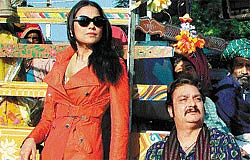
It does look like the winds of change are blowing across Mumbai’s film studios and they are strong enough to blow away all that formula films were made up of once upon a time. Yes, gone are the tried and tested story lines with two item numbers, one rape, one old loving mother, chocolate faced hero, good girl next door leading lady plus a few songs fitted in, well just about anywhere, to give frisky audiences a chance to fling their loose change at the silver screen and shake their hips in the aisles. All that is taking the back seat lately, unless a director with guts is coming up with a loud, over the top Bollywood parody like Dabangg. Which is fun too. We have a spate of cinema suddenly that can safely be categorised as ‘different’.
Amitabh Bachchan played a 69-year-old partial to purple shades, Harley Davidson bikes and leather jackets in Bbuddah Hoga Tera Baap while Vinay Pathak played the bumbling fool once again in Bheja Fry 2. The new Hindi film hero can now be a sari salesman from Karol Bagh (Vinay Pathak in Chalo Dilli); an elderly middle class man frustrated by terrorism (Naseeruddin Shah in A Wednesday); a portly, stupid, non glamourous office clerk aspiring to be a singer (Vinay Pathak again in Bheja Fry), a spoilt young collegiate searching for an identity (Ranbir Kapoor in Wake Up Sid), a Sikh officer stealing information from his boss for his own private enterprise (Ranbir in Rocket Singh); a Mumbai don bored with his life (Rahul Bose in Kucch Love Jaisa). Or vice versa. It does look like our perception of who we consider heroes is changing.
No longer do film stars look like unattainable gods, who can only pout from posters stuck on our — the lesser mortals’ — bedroom walls. Gone is cinema’s fixation with Greek gods and breathless beauties. Film directors as well as audiences are making the distinction between looks and talent and talent is getting a fair chance too. The result is that we now see people like us not just in mirrors but also the silver screen. Ordinary lookers like Irfan Khan, Kay Kay Menon, Shefali Shah, Piyush Mishra, Konkana Sen are getting their place in the sun and in film scripts. And since most of them have more talent in their little fingers than many big stars have in their dictionaries, it does make more interesting cinema.
Gone are the days when songs had to be shot in Switzerland, stories moved across continents and relationships were so complicated that it gave you a migraine just to figure out who was in love with who. Now, we have simple identifiable stories about people missing planes and taking taxi rides to Delhi, aspiring singers, NRI boy looking for a homely bride, a college girl’s dream to be a wedding planner, a coach trying to make his team win. Welcome back to the realism and simplicity of popular cinema’s equivalent of Malgudi Days.
You can see that the man-woman relationship is changing. Aimless college pass out Bittu takes his orders from the clear-headed, ambitious Shruti in Band Bajaa Baraat; Lara Dutta is the head of a big firm with 600 employees working for her in Chalo Dilli; Shefali Shah is a bored housewife who leaves her house to take a ride with a hitman when her husband forgets to wish her on her birthday. Kalki Koechlin plays a rebel youth who is sucked into a sinister tale after a night of drunken partying. A far cry from the sweet, little girls next door that we ODed on in the past.
We have recently seen at a theatre close by, a woman who murders her husbands when they disappoint her in love (Saat Khoon Maaf), a young girl, who shrugs off a one night stand with her best friend after she realises her love is not being returned (Band Bajaa Baraat), a bride-to-be, who gets her boyfriend’s name tattooed on her chest, swears like a pirate, smokes on the sly and takes swigs of neat rum at wedding parties (Tanu Weds Manu). Don’t look now, the Hindi film heroine is changing. Leading ladies in Bollywood cinema are unrecognisable from the sati-savitris, who the hero promptly fell in love with at first sight and then wanted to take home to mom.
Films are bringing us stories and not judgements. No longer does the heroine get pregnant if she commits the sin of sleeping with her boyfriend before marriage; the hero doesn’t always take the path of truth and ahimsa to win his rewards and the villain doesn’t always end up being beaten, thrown from a tower or impaled on a stake just before the final credits roll past. Directors are telling us interesting stories — some funny, some dark, some mired in deep fantasy and some real life stories.
They are resisting the urge to play god and mete out divine justice for the way characters behave. Result is that we are getting some fresh, unpredictable cinema to watch. We appear to be moving away from half-witted stories and retarded plots that blatantly insult the intelligence of all viewers above the age of 10. New directors are bringing to us some new stories and attitude with a lot of pep, fizz and panache.
If there’s more where that is coming from, then it’s reason to pop open a bottle of champagne and book tickets for the new release next Friday.
